

WHO accused of conspiring with Italy to remove damning Covid report. The World Health Organization (WHO) has been accused of conspiring with the Italian health ministry to remove a report revealing the country’s mismanagement at the beginning of the coronavirus pandemic – the publication of which was intended to prevent future deaths.
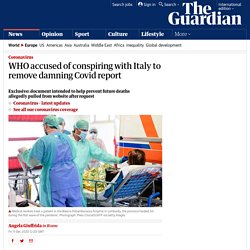
Technical guidance publications. WHO warns of 'one big wave' of virus – as it happened. Latinos in California are becoming ill and dying from Covid-19 at far greater rates than other groups, the state’s top health official has warned, prompting new outreach and data collection efforts as cases surge.
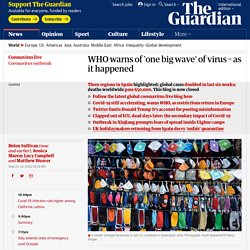
Latinos make up 39% of the population in the US state, but account for 56% of Covid-19 infections and 46% of deaths, the California health and human services secretary, Dr Mark Ghaly, said. Of particular concern is the heavily Latino Central Valley agricultural region, where cases continue to soar and hospitals are becoming overwhelmed even as the rate of new infections may be slowing in the state overall, Ghaly said. Experts said a perfect storm of workplace issues and cultural traditions in the Central Valley has led to a crush of cases that has devastated many families. Many Latinos in the Central Valley are poor, working in industries such as agriculture that have been deemed essential during the pandemic. WHO warns travel bans cannot be indefinite, says countries must fight coronavirus at home. Bans on international travel cannot stay in place indefinitely, and countries are going to have to do more to reduce the spread of the novel coronavirus within their borders, the World Health Organization said on Monday.
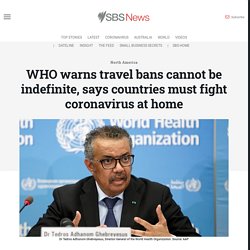
A surge of infections has prompted countries to reimpose some travel restrictions in recent days, with Britain throwing the reopening of Europe's tourism industry into disarray by ordering a quarantine on travellers returning from Spain. Only with strict adherence to health measures, from wearing masks to avoiding crowds, would the world manage to beat the COVID-19 pandemic, the World Health Organization's director-general, Dr Tedros Adhanom Ghebreyesus, said at a virtual news briefing. "Where these measures are followed, cases go down. Where they are not, cases go up," he said, praising Canada, China, Germany and South Korea for controlling outbreaks. A73 R1 en. Independent evaluation of global COVID-19 response announced. WHO Director-General today announced the initiation of the Independent Panel for Pandemic Preparedness and Response (IPPR) to evaluate the world’s response to the COVID-19 pandemic.
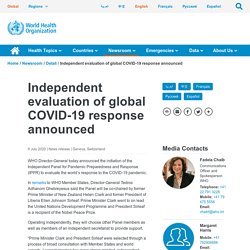
In remarks to WHO Member States, Director-General Tedros Adhanom Ghebreyesus said the Panel will be co-chaired by former Prime Minister of New Zealand Helen Clark and former President of Liberia Ellen Johnson Sirleaf. Prime Minister Clark went to on lead the United Nations Development Programme and President Sirleaf is a recipient of the Nobel Peace Prize. Operating independently, they will choose other Panel members as well as members of an independent secretariat to provide support. “Prime Minister Clark and President Sirleaf were selected through a process of broad consultation with Member States and world experts. I cannot imagine two more strong-minded, independent leaders to help guide us through this critical learning process.” said Dr. World Health Organization says $45 billion is needed to fight COVID-19. A World Health Organization-led coalition fighting the COVID-19 pandemic is asking government and private sector donors to help raise $45.6 billion (US$31.3 billion) in the next 12 months to develop and deliver tests, treatments and vaccines for the disease.
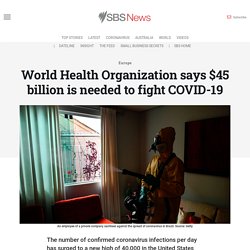
Renewing its call on Friday for global collaboration against the pandemic, it said $4.9 billion ($US3.4 billion) had been contributed for the coalition to date, leaving a funding gap of $40.7 billion (US$27.9 billion). Of that, $19.9 billion ($US13.7 billion) was "urgently needed". COVID-19 testing in Jakarta. Getty. Surgisphere: governments and WHO changed Covid-19 policy based on suspect data from tiny US company. The World Health Organization and a number of national governments have changed their Covid-19 policies and treatments on the basis of flawed data from a little-known US healthcare analytics company, also calling into question the integrity of key studies published in some of the world’s most prestigious medical journals.
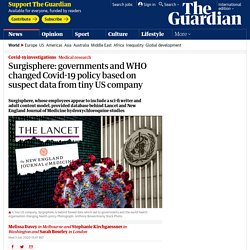
A Guardian investigation can reveal the US-based company Surgisphere, whose handful of employees appear to include a science fiction writer and an adult-content model, has provided data for multiple studies on Covid-19 co-authored by its chief executive, but has so far failed to adequately explain its data or methodology. Data it claims to have legitimately obtained from more than a thousand hospitals worldwide formed the basis of scientific articles that have led to changes in Covid-19 treatment policies in Latin American countries. Late on Tuesday, after being approached by the Guardian, the Lancet released an “expression of concern” about its published study. : WHO advises to wear masks in public areas, reversing policy. Image copyright Reuters The World Health Organization (WHO) has changed its advice on face masks, saying they should be worn in public to help stop the spread of coronavirus.
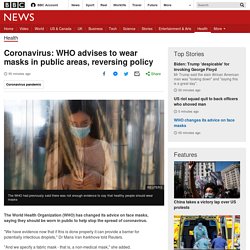
"We have evidence now that if this is done properly it can provide a barrier for potentially infectious droplets," Dr Maria Van Kerkhove told Reuters. "And we specify a fabric mask - that is, a non-medical mask," she added. The WHO had previously said there was not enough evidence to say that healthy people should wear masks. The organisation had always advised that medical face masks should be worn by people who are sick and those caring for them. Globally, there have been 6.7 million confirmed coronavirus cases and nearly 400,000 deaths since the outbreak began late last year, according to the data complied by America's Johns Hopkins university. The organisation said its new guidance had been prompted by studies over recent weeks.
"We are advising governments to encourage that the general public wear a mask. " Coronavirus: Trump gives WHO ultimatum over Covid-19 handling. Image copyright Getty Images US President Donald Trump has sent a letter to the head of the World Health Organization (WHO) threatening to pull US funding permanently over Covid-19.
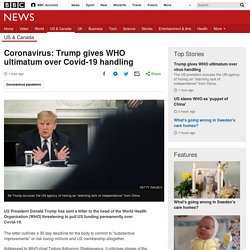
The letter outlines a 30-day deadline for the body to commit to "substantive improvements" or risk losing millions and US membership altogether. Addressed to WHO chief Tedros Adhanom Ghebreyesus, it criticises stages of the body's response since December. Earlier in the day, Mr Trump called the UN's health body a "puppet of China". The president, who faces re-election this year and has himself been criticised for his handling of the pandemic, has blamed China for trying to cover up the outbreak and has accused the WHO of failing to hold Beijing to account.
The US has more than 1.5 million of the world's 4.8 million confirmed cases of coronavirus so far, with more than 90,000 deaths. Mr Trump's ultimatum also comes at a time of pressure for the WHO. Director-General's opening remarks at the media briefing on COVID-19 - 27 April 2020. Good morning, good afternoon and good evening.
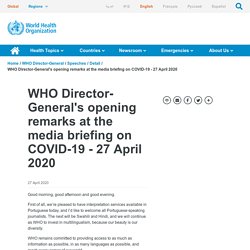
First of all, we’re pleased to have interpretation services available in Portuguese today, and I’d like to welcome all Portuguese-speaking journalists. The next will be Swahili and Hindi, and we will continue as WHO to invest in multilingualism, because our beauty is our diversity. WHO remains committed to providing access to as much as information as possible, in as many languages as possible, and reach every corner of our world. I have said since the beginning that the most important resource in the fight against COVID-19 is solidarity. Solidarity, solidarity, solidarity. Myth busters. WHO Manifesto for a healthy recovery from COVID-19. "The pandemic is a reminder of the intimate and delicate relationship between people and planet.
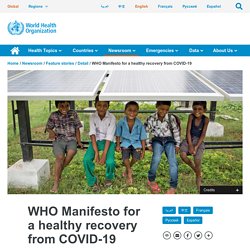
Any efforts to make our world safer are doomed to fail unless they address the critical interface between people and pathogens, and the existential threat of climate change, that is making our Earth less habitable. " WHO Director-General Dr Tedros Adhanom Ghebreyesus. Address to the 73rd World Health Assembly.
May 18th 2020. WHO. a6885ec2-77a6-4a1a-ba5d-604aed5047f7 Coronaviruses are a large family of viruses that are known to cause illness ranging from the common cold to more severe diseases such as Middle East Respiratory Syndrome (MERS) and Severe Acute Respiratory Syndrome (SARS). A novel coronavirus (CoV) was identified in 2019 in Wuhan, China. This is a new coronavirus that has not been previously identified in humans. This course provides a general introduction to nCoV and emerging respiratory viruses and is intended for public health professionals, incident managers and personnel working for the United Nations, international organizations and NGOs.
Coronavirus disease (COVID-2019) R&D. WHO 2019 nCoV IPCPPE use 2020.2 eng. The COVID-19 risk communication package for healthcare facilities. Risk communication and community engagement (RCCE) readiness and response to the 2019 novel coronavirus (2019-nCoV) Infection prevention and control. Infection prevention and control during health care when novel coronavirus (nCoV) infection is suspected This is the first edition of guidance on infection prevention and control (IPC) strategies for use when infection with a novel coronavirus (2019-nCoV) is suspected. It has been adapted from WHO’s Infection prevention and control during health care for probable or confirmed cases of Middle East respiratory syndrome coronavirus (MERS-CoV) infection, based on current knowledge of the situation in China and other countries where cases were identified and experiences with severe acute respiratory syndrome (SARS)-CoV and MERS-CoV. Infection Prevention and Control (IPC) for Novel Coronavirus.
Версию этого курса на русском языке найти можно по этой ссылке: The Japanese version of this course is available here: La version française de ce cours est disponible sur: The Indonesian version of this course is available here: La versión en español de este curso está disponible aquí: A versão em português deste curso está disponível aqui: La versione italiana di questo corso è disponibile qui: Srpska verzija ovog kursa je dostupna ovde: Strategic Preparedness and Response Plan. Coronavirus declared global health emergency by WHO. Media playback is unsupported on your device The new coronavirus has been declared a global emergency by the World Health Organization, as the outbreak continues to spread outside China. "The main reason for this declaration is not what is happening in China but what is happening in other countries," said WHO chief Tedros Adhanom Ghebreyesus. The concern is that it could spread to countries with weaker health systems. Meanwhile, the US has told its citizens not to travel to China.
The state department issued a level four warning - having previously urged Americans to "reconsider" travel to China - and said any citizens in China "should consider departing using commercial means". China has said it will send charter plans to bring back Hubei province residents who are overseas "as soon as possible". A foreign ministry spokesman said this was because of the "practical difficulties" Chinese citizens have faced abroad. The WHO said there had been 98 cases in 18 other countries, but no deaths. Getty. Confirmed as pandemic by World Health Organization - BBC News.
Media playback is unsupported on your device The coronavirus outbreak has been labelled a pandemic by the World Health Organization (WHO). WHO chief Dr Tedros Adhanom Ghebreyesus said the number of cases outside China had increased 13-fold over the past two weeks. He said he was "deeply concerned" by "alarming levels of inaction" over the virus. A pandemic is a disease that is spreading in multiple countries around the world at the same time. However, Dr Tedros said that calling the outbreak a pandemic did not mean the WHO was changing its advice about what countries should do. Mental health and psychosocial considerations during the COVID-19 outbreak. Pneumonia of unknown cause – China.